 |
| Mennonite girls looking back from their horse carriage (Image © AP) |
——————————————————————-
A paved road leads me west towards Santa Cruz city. The road is straight and flat and to the sides the land is green but completely featureless, no trees in sight. I see some wooden shacks ahead then, a traffic cone in the middle of the road, just one, and beside it; a police officer. Sometimes I can sneak through but this time the officer raises his hand and I have to stop. I pull over on to the hardpack dust, there is litter, dogs, diesel fumes and heat, the throaty cough of trucks and buses coming and going. The shacks I saw are vendor’s stalls, small restaurants, taking advantage of the stopped traffic. All this for a cone and an officer. The officer is friendly though and can’t contain his smile, chatting excitedly and giving my driving license nothing more than a cursory glance. Like most people he asks where I’m from, where I’m going, why my number plate is missing and – as is becoming more and more common – if he can buy my bike, to which I explain that he can’t because it’s not Bolivian, it’s foreign registered.
“Pah! no problem!” he says, slapping his hands together, wiping the scandal clean away as if a little dust, “it’s just a piece of paper and this is Bolivia! How much do you want for it?”
I ruminate and the officer beings to tap my license against his hand impatiently turning out his lip, raising his eyebrows suggestively in encouragement. “Well,” I say, “I still have to go to Argentina and -”
“What for?”
“Well, what do you mean, I don’t know, I want to…”
“But why? Just take the aeroplane.”
“But I won’t see anything!”
“So, take the bus!”
“Look, I’m riding to Argentina and then I have to come all the way back! By then the bike is probably going to be complete junk! If I’m lucky maybe $1,000?”
“$1000!” he says as if I must be mad.
“Yeah…” not sure if he thinks it’s too much or too little.
“But is Honda no?” he says, frowning down at the bike, “Pah! Is too cheap, it’s worth at least $1400.” I only paid $1800 and knot my face in disbelief until he adds with a twinkling smile, “…but I’ll take it off you for $1,000!”
I reply that I will come back after Argentina.
It takes me a long while to find a hostal in the city centre, but eventually I find a good budget place with just enough space to squeeze the bike into the entrance-way. The hostel is quite basic, run by a laid back tubby couple who shuffle about the place, cleaning occasionally but mainly sitting for marathon sessions in front of the TV. The rooms are Spartan but nice; no dark places holding creepy unknowns or bad smells of a creepy past. And, whilst the mosquito mesh is untorn it is stretched between wonky frames and the clumsy clattering doors likewise fit like square pegs in a round hole. There is a squeaky metal bed with a sunken mattress and a bedside cupboard perfectly sized to store vile smelling boots.
 |
| Boot locker |
Despite the slightly rough edges, the place is kept very clean and tidy, leaving the only other concern with budget accommodation; the clientele.
When a traveller buys a ticket to anywhere, they are actually buying a pass. This pass permits the removal of all the shackles society has placed on them, leaving them free to be whoever they want to be, think they are or just who they actually are. Hostels therefore are the assembly points for these oddballs on extended day-release. There are those that are amusing, interesting, peculiar and often quirky, living the lives of bums on a semi-permanent basis. There are those who have fully embraced the travelling lifestyle and who do absolutely everything in their power to say, “I am a traveller,” they appear to be sponsored by an artisan market and drink “mate de coca” (tea of coca[ine]) as further testament to their traveller status, they’ve probably worked on a farm, most likely they can juggle. Then there are groups of guys, three is the magic number, often with matching beards and matching clothes, at least one guitar between them, their Spanish begins at Hola and ends at Gracias, after ten days drinking in Santa Cruz they’ll get a bus to Sucre and start over, then they’ll go to Cusco and get pictures of Machu Picchu and everyone will think they are legends (yes, yes, I am a condescending shit), they probably can’t make a decision individually by themselves, they try hard to walk in step with each other. There are couples too, inseparable, impenetrable, except to other couples, terrified of soloists, believe us to all be rapists, serial killers or just shits judging by looks given to us. There are those who seem to dislike travel, or perhaps they’ve just started, not quite in the swing of it ( I remember the days!), they appear to have just stepped out of a North Face catalogue and into a land where the drab pastel shades stand out just as much as an Indian waiting in line in KFC holding a spear and with his penis strapped up in a piece of bamboo would, they look scared when people say hello and cling on desperately to a smart phone, a laptop, the West. And finally there are “dodgy folk,” often out for long periods of the day and night, they leave looking edgy, and return looking edgier still, pale, greasy, slimy even, looking – you feel sure – to steal your socks the moment you put your feet up. We all share one thing in common, we all eat noodles. And actually, here in the Santa Cruz hostel, I must say they were all very nice noodle eaters and I was instantly happy.
 |
| The courtyard of the hostel, tranquilo |
The shaded rooms of the hostel are set off from a narrow open courtyard of bright sun, white walls and hot terracotta tiles. Chairs are occupied by baking towels whilst people hide within the cooler interior of the rooms to sleep until late in the day. As the sun and temperatures drop so too the quirky characters skulk out of their rooms to feed, bask, drink, talk and to read. I read whilst a group of German girls and lecherous Latin males bask, drink and talk. Talk which seems a bit inane, a load of preamble, foreplay. I sit staring at my book, the same damn page, wanting them to be quiet, but I can’t help but eaves drop, and wish they would just go and have sex already! Jealousy. As I read a man comes over, dressed for safari, a bit Ray Mears, and picks some leaves from the plant next to my chair, to make tea, as one of the Latinos – not very Ray Mears – comes and stubs his cigarette out in the pot. A couple passes by on their way out and I smile at them, the man doesn’t notice me but the girl scowls at me like I’ve occupied the hostel’s honeymoon suite. Sitting opposite me is another reader, and as I wonder what my face must say to people to deserve such scowls, I also wonder how long he’s been there, and what he’s thinking, maybe he can help me not be so cynical.
“Do you think they’ll ever shut up?” he says.
“Funny, I was just thinking….”
“Jesus, she’s got a nice ass though.”
“Mm.” We look a moment as she gets up to rearrange the towel on her chair, a silence falls as we, the Leeches and all others in the vicinity – except Ray Mears, quite busy with his tea – take a moment to leer until too soon she sits. Immediately conversations resume all down the courtyard. “Nice everything,” I say, “except her voice, siiiiii yarrrr, grarseearse! You know sometimes I think my Spanish is sort of okay, and then I hear someone like her and I start to wonder if I sound like that?”
“You speak Spanish?”
“Well, a bit, you know, I get by.”
“That usually means it’s good.”
“No…it’s not honestly. Well, I dunno, some days I think I’ve totally got it, I can understand everything and talk with people for hours. Then other days I can’t understand one word, not one, and I wonder what people must think of me. You?”
“Well, actually Spanish is my first language, I’m half Bolivian.” (though his accent suggests USA).
“Ha! No way! From Santa Cruz?…I’m jealous!…”
“Nah, come on…!”
“Well, I just mean it must be so nice, to understand everything. I wish I could, especially in groups! I’m terrible in groups! I suppose I should study more….What you reading?”
“Well, it’s kind of funny, I’ve just got off reading Maugham…..” he pauses and I nod an “ahhh, Maugham” face, “I’m telling ya,” he continues, “that thing was massive! Practically a cube…MASSIVE. God forbid I ever dropped it, I virtually had to winch that sucker back up to the lectern,” he pauses for effect, thinks he’s on Broadway or something, “….anyway, so now I’m reading Jurassic Park.”
“What?”
“Jurassic Park. After Maugham I sorta needed something a bit lighter, you know? So, I was a looking around the shops, right, and there isn’t really much in the way of bookstores here, it’s kinda hard to find anything, just Clive Cussler, Twilight…and then I saw…”
“Jurassic Park?”
“Yeah, right!” he says, “This Crichton guy is badass, I’m right there with those raptors.”
“Hmm, well perhaps I should check it out!”
“You like Hemingway?”
“Huh?”
“Hemingway, you like him?”
“Oh yeah! Actually I’m reading Moveable Feast!”
“If you are lucky enough to have lived in Paris,” he begins, ” then wherever you go for the rest of your life, it stays with you, for Paris[I join in] is a moveable feast.” the book’s epigraph.
“Jesus, that’s quite a memory.” I say.
“I’m studying Hemingway for my doctorate.” His phone rings then, it’s his girlfriend, asks what he’s been doing, “you know, reading Maugham, went to the bookstore, studied, wrote a little.” So, he’s one of the quirky bums I think and the German girls erupt into booming deep laughter.
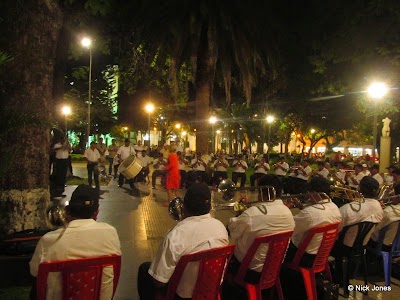 |
| The orchestra sets up in the plaza |
Nico and I walk into the city centre to sit in the plaza and watch the girls watch the boys, watch the world go by. Nico believes that almost every girl is into him. Maybe they are, I wouldn’t know. I can’t remember ever seeing a girl and thinking, “she’s into me”. I’m not saying they don’t think it, just I’ve never seen it, most of them look at me as if I’ve just dumped them. Opposite us is a chess table where a frantic game is being played out, the men serious, narrowed eyes, the pieces slammed with resonating clacks from square to square and watched by a crowd of old men on tenterhooks. Children are chasing the pigeons around the fountain, or else feeding them and a large brass band is setting up. Up in the trees birds squawk and a group of girls laugh amongst themselves as they pass by us and sit on the bench next to the chess table. The girls are perhaps 18 years old, but that is of no concern to Nico. “If she looks up and looks at me,” he says of one in particular, “then she likes me…” I wonder if it’s that simple, if she might instead look at me and not Nico. Then, right on cue, she looks up, at Nico, “booom!” he says.
“Nico, she’s about 12!”
“Well, you know what they say. Old enough to bleed, old enough to breed.”
“Yeah, right, grass on the pitch and all. But seriously.”
“What, you wouldn’t?”
“You would?”
“Sure! What, you think she’s too young?”
“I don’t know, I guess. I mean, how old do you think she is?”
“I don’t know, 18?”
“More like 16 I reckon.”
“I slept with a 13 year old once.”
“What? How old were you, 15?” I reply.
“Nah, I was 30. She was a hooker.”
“And thirteen?”
“Yeah, It was my birthday, and my uncle got her for me, I remember it, he called me over, said, hey come here I got something special for ya, took me through and there she was.”
“What, and you….”
“She liked me, I wasn’t her usual type of clientele, you know, not some fat old sleazy guy, I could tell she was in to me.” I didn’t tell him that he thought every girl was into him, “and she loved it, obviously had a lot of experience. You know this guy here,” he says pointing to a man walking by. The man pushes a trolley carrying green and cream coloured thermos flasks – coffee and milk – and small paper cups, he wears a cream suit with green cuffs and collar, sort of like a chef or a doorman, but with the triangular hat of a burger boy. “He’s been selling coffee here for 40 years. He started all this,” says Nico, meaning the coffee trade in the plaza, as many others now sell it, “but his is the best coffee. You been to the museum?”
Nico and I would spend a few evenings hanging out together, talking about his sexual escapades, or watching his magic tricks and slight of hand, or watching boxing at his local club as the women spectators shouted “kill the pig!” Then we’d head out to eat skewers of chicken hearts or sit in a juice bar. I liked Nico, his intense stare, sharp intellect, extreme memory, rapid changes in conversational direction and even the way he’d never laugh just say, “ha, that’s funny,” but I’d never hear from him again and I knew it even then, for him it seemed I was just a spectator.
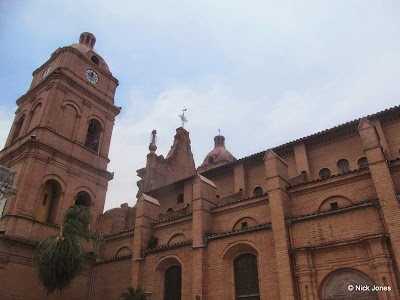 |
| The main church in Santa Cruz |
 |
| A tense chess game |
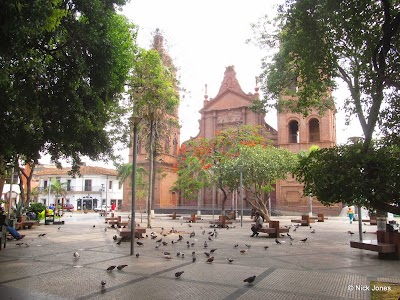 |
| The early morning plaza in Santa Cruz |
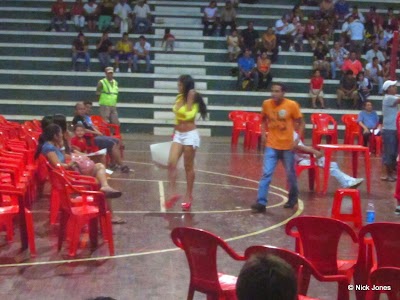 |
| Watching the “boxing” |
 |
| Seeing the lawyer to extend my customs papers (I didn’t even have to do this at the border!) |
In cities my plan is simple; walk around. But, with every street in the Santa Cruz grid looking almost identical, the same pale white walls and wonky terracotta porches, I often find myself walking in circles trying to find the juice bar I’d passed yesterday, the market I’d seen five minutes ago, or just trying to find my way back to the plaza, the hostel. After a few days in the city I’ve worked out my favourite vendors and make sure to buy from them every day (if I can find them). I’m not sure why I do this, maybe a friendly face and some conversation, or perhaps because the fruit girl lets me try all the tropical fruits or because I feel sorry for the timid juice-bar girl working for the overbearing owner and I just wanted to be nice (actually I felt sorry for the fruit girl too, she worked very long hours). When I’m not lost or buying things needlessly from people I feel sorry for, I am extending my visa and customs papers in two packed offices whose “systems” only a sadist could have devised. Most annoying is that it is much more complex than the border. However, the time spent queuing in immigration does give me chance to watch Mennonite families obtaining their visas and perhaps passports, standing there quietly, patiently whilst the locals around them fan themselves, agitated, vocal. It reminds me that I really need to find out more about them.
 |
| The fruit girl who left her house at 5am and returned at 11pm 6 days a week |
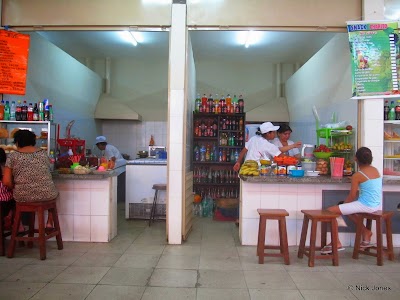 |
| Juice bars, mix ice, sugar, milk and fresh fruit, yum yum yum |
The first Mennonites came to Bolivia initially from Paraguay, though their roots take them back as far as Switzerland, Germany and the Netherlands. Not to be confused with the Jesuits of course, who also arrived much earlier, nor even the Amish, the Mennonites didn’t arrive in Bolivia until the 1950’s and at first just twelve families. They have been a people always on the move, migrating from country to country in an attempt to maintain their traditional way of life, one that eschews electronics, radio, TV, alcohol, cars, bicycles, sports and music (other than their own religious music), violence and war, they do not pay social security, health insurance nor do they accept benefits, they wear “plain clothes”, speak Plautdietsch (low German) and live in fairly sequestered communities whose education consists of the bible and the farm.
 |
| From Google Maps |
Those families now in Bolivia could trace their ancestral movements for example, through Paraguay, Belize, Mexico, Canada, Russia, Prussia and all the way back to Germany. As Anabaptists, their migrations were initially a result of religious persecution from European Protestants and Catholics. Whilst today their religion is more widely accepted, other, contemporary pressures remain from surrounding society; their surrogate country’s legal requirement of standard education, forced use of the country’s language or military service requirement. If not from surrounding society then the problems stem from within the colonies; lack of available land and water due to rapidly increasing colony population, or in disagreement with their colony’s adoption of more modern methods of living; use of electricity, computers, mobile phones, rubber tyres, or even cars. Moving to Bolivia, the Mennonites were offered land in the Santa Cruz region, on the fringes of the Gran Chaco, a semi-arid jungle with a harsh climate; extreme heat and dry winters. For those newcomers the difficult climate meant life initially consisted of just barely subsiding. Now though, they prosper, growing vast amounts of soy and sorghum and manufacturing dairy products in an almost industrial way. Whilst these farms are small taken one by one, the burgeon of population thanks to large families (sometimes twelve children each), means that the environmental impact the Mennonites (and others in the region) have made is vast. Drive any road in the area (or just look at google maps) and one thing is clear, they have taken a lot of land. Land that was once low thick jungle is now a patchwork of open fields, long, narrow and perfectly flat, tilled to the horizon with hardly a tree in sight….though sometimes a tractor.
One tradition they would prefer to lose, is that new problems are just around the corner, to hinder their way of life, and in Bolivia today there are perhaps two main threats; land-reforms and an influx of non-Mennonites and accompanying vices; drugs, alcohol, consumerism, electronics, music. With president Evo Morales looking to give back land to the people and claiming that some of the Mennonites have taken land that wasn’t theirs to take, the Mennonites could find themselves without a home, or else with a large debt. Non-Mennonite locals however, think otherwise, stating that Evo won’t be as foolish as to let the Mennonites leave, after all they are not just feeding themselves, but a large part of the nation. For now they are here and in Santa Cruz they are always to be found visiting the same place, the far end of the market, farthest from the attention of the main centre and closest to the ring-road out of the city. The men and boys still wearing work-overalls and navy truckers caps, spotlessly clean and pressed to absolute perfection despite the heavy heat and crazy bustle of the market, the women in their plain cut, homemade, floral dresses, wire framed spectacles and bonnets or straw sun hats.
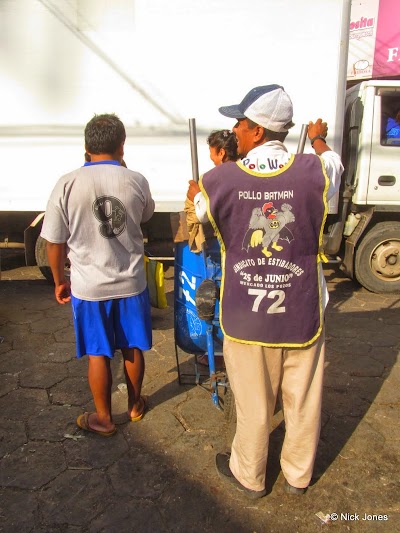 |
| Batman Chicken Porters |
 |
| Pineapple sellers |
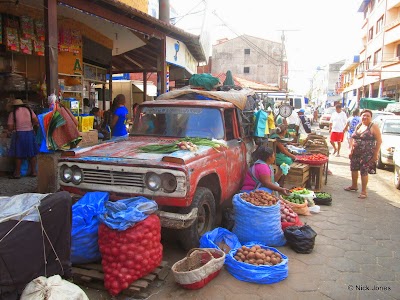 |
| Not a tow zone, but best not to park here |
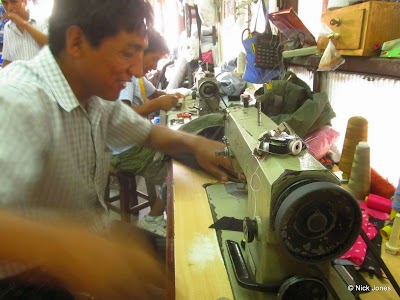 |
| Repairing my trousers |
 |
| A young vegetable seller |
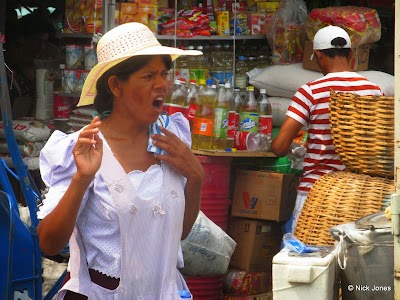 |
| How girls normally look at me |
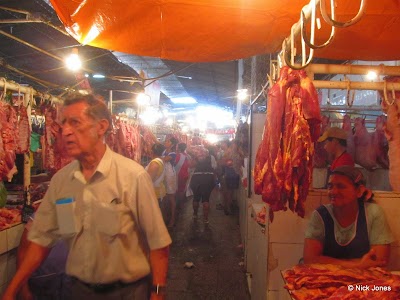 |
| More meat than they can possibly sell….at least today |
The market isn’t huge, but those streets it does fill are bursting with activity. There are shops whose wares spill out on to the pavement, on which are stalls, standing alongside wheelbarrows of sliced pineapples, butting up to baskets stacked high with towers of bread, overshadowing cloths laid on the floor with a neat scattering of ancient relics dug up from the rubbish tips, besides juicer trolleys – the women frantically pressing oranges – then tattooists tattooing, barbers shaving faces, women painting nails, all in the street and amongst a mob of desperate shoppers. The flustered shoppers are aided by porters, porters proudly sponsored – for some reason -by the main fried chicken restaurant chain in the city, called “Batman Chicken” (a chicken in a Batman outfit). These porters carry or trolley loads of purchases forcefully out of the market to waiting buses or taxis, taxis which are also senseless enough to drive through the market. All of this makes stalking Mennonites quite difficult and after a week in Santa Cruz I have just three dismal photos of Mennonite limbs and staring gormless Latinos. I decide that a change of tact is in order…and I have just the plan.
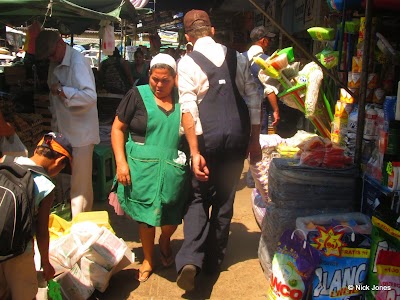 |
| Stalking Mennonite man |
 |
| Stalking Mennonite Women |
After several days humming and hawing about the deeper technical aspects of my new plan, I eventually pluck up some courage and go in search of any Mennonite man with a friendly looking face. Finding one I introduce myself and tell him directly, and nervously, my plan; that I want to visit his house. “My house? You want to visit my house? What for?”
I hadn’t anticipated questions, nor were my nerves considered as part of the plan and I realise those days spent planning were not spent wisely. I bumble on for 10 minutes talking about my trip, my interest in his culture, punctures, the weather, his family’s laundry/ironing habits and those impeccable trouser creases. Luckily I don’t mention stalking them in the market for several days nor the fact that more or less all girls think I’m a baby eater.
“But what will we do?” he asks.
“I don’t know…talk, look around……eat lunch?”
“You want to come to my house and eat?”
“Well….”
“Ahh, OK,” he says enlightened, “so you want to see how we live and what we eat?”
“Yeah, I guess, well, more or less.” I say.
“OK,” he agrees with a shrug, maybe just so he can escape, and he promptly fires off an address, one which seems impossibly short, “219c”. Not sure if I’ve heard correctly, I ask him to repeat it, and then ask him – just to make absolutely sure – to write it down. 2-1-9-c. “Is that it?” I ask, “But, where is it? How do you get there?”
“Down route 9 and turn left,”
I try to remember which one is route 9, but can’t and unsure I just ask, “How far down route 9?”
“I don’t know, are you going by bus?”
“No, motorcycle…”
“Well in the bus it’s about half an hour…I don’t know about motorcycle,” he says, and perhaps finding my questions a bit arduous, “It’s easy,” he adds, “just ask for Peter Peter.”
“Peter Peter?”
Feeling that I’ve pushed the limit with my questioning I say goodbye and begin wondering if I might have just let my best chance slip by, or that perhaps he was trying to fob me off, I mean who calls themselves,”Peter Peter”? Surely I’ll never find this place.
The next day and long after leaving the hostel I’m not sure I’ve even moved at all, still trapped as I am in the thick of the city, the narrow corridors of twinned streets. At long intervals I find myself at a place I recognise, a certain roundabout with a statue, the large glass Samsung building, the uniquely wide boulevard exiting eastwards (I want west), or the street that doubles as a taxi and bus stop – a hectic and maddening road which I’d sworn to avoid. Motionless and despondent I think of Peter Peter telling me to turn left after thirty minutes, but already I’ve been at this for hours.
With some relief I reach the turning south on to Route 9 and feeling like I can finally make some real headway, I stop at a shade tree to eat lunch and paddle about in the usual accompanying litter. Then, I continue on along the main paved road south until I come to a few huts, one or two shops amongst them. Glad to be out of the city I sit down for a drink and it’s then I notice a turning off the main road here, and actually it’s been about half an hour. Here seems as good a spot as any and I decide to take the turning and slam my bottle down with galvanised resolve.
A broad and rutted laterite road spears its way east into the lattice work of other similar dirt roads and flat fields. No sign of Mennonites yet, but pausing at a wide open crossroads a Latino man approaches from a repair shop and asks where I’m going. “Twenty, fifty, one-hundred…..” he ruminates, ticking off plots along the horizon, “mmmm…..219….219….I think that’s real far, over that way,” he says pointing north east, “what’s his name, who ya goin’ to see?”
“Well, he said his name is Peter Peter.”
“Peter! Oh yeah, I know Peter, real nice guy…but ooooh, that’s far….!” I can’t believe my luck, perhaps now I’ve got a chance after all! The man gives me some incredibly lengthy directions to compete with Maugham and I try my best to remember, quickly thanking and leaving the Latino man the moment he finishes, before I forget.
 |
| Mennonite House |
 |
| Mennonite carriages |
Shortly and I feel like I must be getting closer, now in 1940s rural Germany. It is truly incredible with horse carts kicking up dust on the rutted mud roads, girls in bonnets, in a line walking from church, boys pushing out trolleys carrying silver churns of the afternoon’s freshly drawn milk, men on old tractors, outside sheds and welding, or with horse and controlling the reins standing on a flatbed trailer along with his flock of blonde sons. There are red brick houses, white picket fences and wind powered water pumps; the shiny metal turbines rising up into the air. There is not a telegraph pole nor electricity pylon in sight. I forget all about the directions and just ride along slowly and carefree between the white fences, turning left or right at will and staring girls with muddy hemmed dresses and blonde blonde hair. I knew the colonies were secreted away here somewhere, and finally I’ve found one. I want to stop and put up my tent, to sit in its porch and just watch, to photograph it all, to remember, just remember…but instead I continue pushing on, north east and hopefully towards Peter Peter.
It’s getting late and seeing a man I stop at his driveway, to try asking about camping. Two boys I hadn’t spotted watch me from the short trees lining the driveway and when I remove my helmet and step from the bike they run off towards the house. I walk up the driveway, somehow riding up didn’t seem right, and the father comes over, a huge burly man whose huge chest acts like a held out hand saying “STOP”. He leans confidently against the gloss black sweep of his horse carriage, and from between the wooden wheels he watches me with an unmoving, calm gaze as I approach. I shake his hand though he doesn’t raise from his lean. The children, they crowd around, near and far, seven or eight of them, inside, around and on top of the safety and familiarity of the carriage, some leaning on their hands closer, staring, intrigued, barefoot, others hiding behind the father. Pixies and elves and nymphs every one. I realise now the difference between Europeans and South Americans, intrigue and interest. But also they have reason and when I ask about camping the father replies matter-of-factly, “what’s in it for me?” I can only shrug, thinking to myself “not much, actually.” We continue to talk then, about his family (from Canada, umpteen children) and my own travels, what I’ve been doing and why I’ve chosen to come here to the colony particularly. Our conversation, which has become friendly and relaxed, gives me the impression that perhaps he is interested and I am almost expecting him to say, “well, if you still want to camp you can, just stick it over there.” But, instead he explains he has work to do, and I say goodbye.
Miraculously I find Peter Peter’s house, quite some distance on, a lovely neat red brick house set off from the road amongst tightly cut grass with a broad view out over flat fields all the way to the horizon. As luck has it a boy comes out, one of his sons surely, polite and formal, listening very carefully. He tells me Peter is still in the city, he won’t be back until later, 6 or 7pm, it’s now 5:30pm. I ask if I can wait, but he seems unsure and I tell him not to worry, I’ll come back tomorrow. Reluctantly I go in search of camp, taking some condolence in the fact that I have at least found the place.
Not only is darkness coming but also a storm, giving me something else to think about as I look for camp. These roads will be dire in the wet, there amongst the deep narrow ruts carved by the thin wooden wheels of the carts – which would no doubt handle the mud with aplomb. I also remember one of the men that I spoke with earlier was welding up a set of steel paddle wheels for his tractor, testament to the difficulties and – I fear – in preparation for the storm. Camp is therefore tricky to find, as I worry about being able to exit in the morning if the rain is bad. I ride up a field track which is near the main (dirt) road running north back to Santa Cruz from which I could get help from a passing truck if need be. It’s one of the problems with camping often overseen, especially in tropical climates where the rain can really pour down in huge quantities, will you be able to escape camp in the morning? Will you even wake up in the same place you went to sleep or find you have been washed off! And if not one of these delectable scenarios will you otherwise find the rivers to be flooded leaving you stranded in no-man’s lands in-between towns?
 |
| Having found a Peterless house, I had to camp…. |
That night the rain is bad but not horrific, a warning of things to come as the rainy season gathers pace. I backtrack to Peter-Peter’s house next morning and with great relief I see him come out of his garage as I peer up his driveway and he waves me to ride up. Parking the bike, Peter passes by his horse and carriage to shake hands. He looks happy with the smile of an old friend and I hope he likewise. Back in the garage and he’s using a soldering iron to plug a cracked radiator from his generator, a generator used to power his tools – he’s a carpenter making horse carriages. Whilst the Mennonites frown upon electronics and cars they will use tractors for work, buses to get to the city and electrical tools and petrol engines around the farm. A neighbour arrives, Jacob Enns, he likewise wears pristine navy blue overalls and trucker cap, making me feel doubly dirty after a damp night and a muddy ride. “Why did you camp in the fields?” says Peter, “You could have stayed here!” making me wish I’d hung around in the dark and returned later last night, what a missed opportunity, I could spend weeks here.
Across from us I can hear children singing from a small hut, the school and for a moment my thoughts are lost as Peter and Jacob talk amongst themselves in German. The main study material in Mennonite schools is the bible, written in Gothic script, singing is formally taught as is reading, writing, arithmetic (measuring land, time), and spelling. They write on slate. Girls usually receive six years of formal education and boys seven years. I’m mesmerised then as I see the boys leaving the classroom, a dozen filing out, one blonde clone after another, flicking their navy blue caps onto their heads exactly as the one before them and then running off, stride for stride. The boys are followed by the dozen girls who walk out as prim and proper as only girls should! If any of Britain’s children had to attend such a school I can only imagine that it wouldn’t be long before they were tossed into the well, or else severely beaten with the King James.
“Are you hungry?” asks Peter.
“Always.”
“OK, come on. Let’s go inside…” he says with a smile.
Inside and everywhere is so clean, I worry about dirtying everything, and say as much. Whilst clean the rooms appear quite bare and despite colourful curtains and decorative cupboards, conversations reverberate off the white walls cold and hard. Peter and Jacob remove their caps and place them on the hat rack hanging from the ceiling, from which dangle the black ribbons of the women’s own straw hats. Peter has a small family by Mennonite standards, just three children, though apart from his eldest daughter who helps her mother cook, the others won’t eat until later. Peter’s wife has uncommon auburn hair, though she is still as stocky as the next Mennonite woman, and more Russian Babushka than Swiss dame. She and her daughter rush around frantically preparing food as if for a Victorian banquet, though soon enough we all sit down. Peter and Jacob bow their heads in silent prayer and no sooner; begin to consume food at a frantic pace. With this particular colony (there are 25 colonies in Bolivia) originating from Mexico, the food is likewise; I see fried tortillas, frijoles (beans), cheese and fruit though only for a few moments until very quickly it is gone. Satisfied, Peter and Jacob bow their heads in another quick and silent prayer as if picking up the signal from a UFO and the meal is finished.
I take some photos, wishing I’d asked earlier, as Peter encourages me to do whatever I like, the wife giggles shyly and disappears, the daughter on the other hand is keen to have her photo taken – at the behest of Peter – though she is likewise shy, and I notice – as is common – she looks downs meekly away from the camera as if to be punished when the camera is pointed. I comment on Peter’s laundry machine as we walk out; a lawnmower engine and two stainless steel tubs, made proudly by himself and then back outside – Peter thinking that time is up – says he’s got work to do, and whilst I wonder about asking to tag along I don’t want to push my luck, for I am immensely lucky to have met him. I thank him greatly, before heading off.
 |
| Cattle feeder |
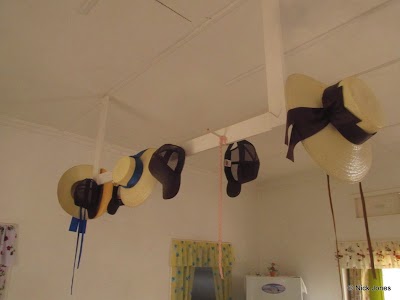 |
| Hat rack in Peter’s house |
 |
| Dinner time! |
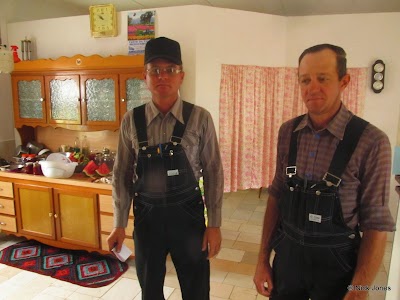 |
| Jacob Ens, left and Peter Peter. Top chaps, and really kind to let me visit. |
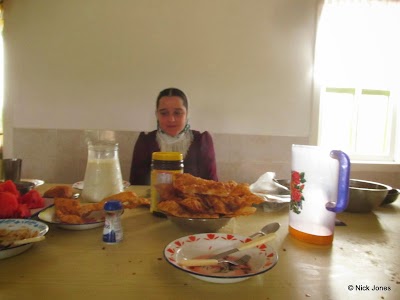 |
| The shy daughter of Peter, was still excited to see this picture, even if it was a bit blurry |
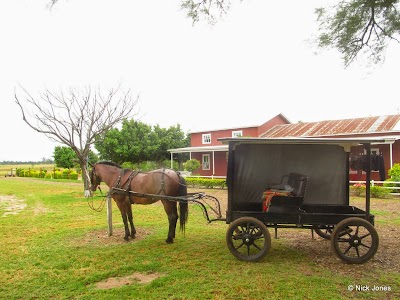 |
| Peter made horse carriages, this his very own, outside his house |
With my visa running out I begin heading back to the west, back up to the altiplano and towards northern Chile. It means backtracking on roads taken earlier and as I approach the green mountains near Samaipata it feels like coming home, the air is sweeter and the mountains stand besides me like old friends should, and no more mosquitoes! I decide to stop off along the way at a place called “El nido de los condores”, “The Condors Nest”. Whilst I’d nearly tripped over a condor in Peru, I hadn’t got a good view and don’t want to pass up what could be my last opportunity.
 |
| It rained in the night, and made the road a bit slippery |
 |
| I had quite wet feet! |
The trail-head is at the very end of a narrow dirt road running into the very bottom of a hot valley. At first I struggle to find the footpath, not realising that the road continues a little farther beyond two small river crossings, ending at a small farm house. Two mad ladies tell me this is the correct place, I need to sign my name and pay 90p, I’m the only visitor today.
Having had some bad experiences with hiking trails in the past I ask the two ladies a few questions; is the trail straightforward, is the path obvious, clearly marked, are there any junctions, is the path overgrown,to what altitude does it go, how long will it take, how long will it take and finally; how long will it take? Of course the crazy ladies have a good old joke about this, telling me there are tigers all over the place, that I will surely die, get lost and that they will inherit a slow bike, a rusty tool kit and a mouldy tent. I give as good as I get, all in good fun, though exact details are lost from my memory and I’m pretty sure they call me a “cheeky bugger” despite me not knowing the Spanish equivalent. They tell me the hike is six hours (I’d read it was 8) then she says I will get there at 1pm (it’s already 10:30am), so I ask if it’s six hours there and back, no it’s six hours, so how will I arrive by 1pm? She looks up into her mind, thinking, and changes the ETA to 2pm, then 3pm then, laughing manically, “maybe by 4pm.” Finally she goes into the back room and comes back to hand me a machete and also offers me a torch, her friend giggling away like a little school girl sidekick. I grab some hunks of bread and water and tell them to make me a coffee for when I get back (I would have said “smoke me a kipper” Red Dwarf fans).
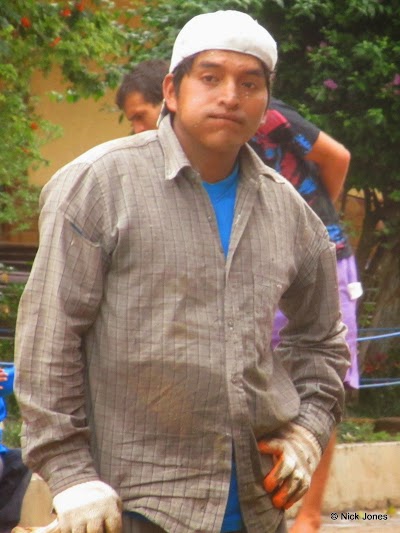 |
| Labourer chewing a huge wad of coca |
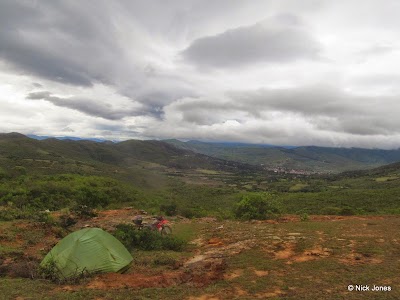 |
| I reached Samaipata and returned to my previous camp spot on my way to see the Condors |
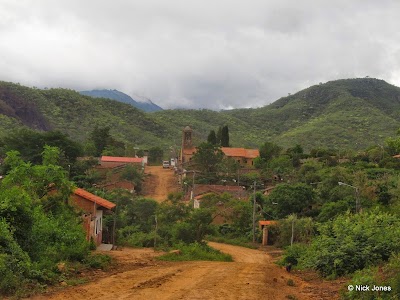 |
| The road to the Condors Nest was good! |
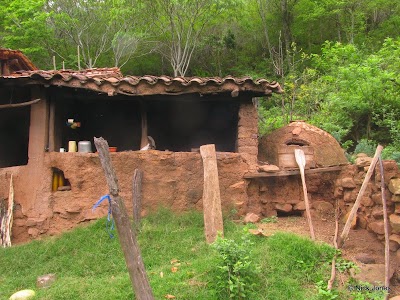 |
| A bread oven outside a house |
 |
| Maize masher |
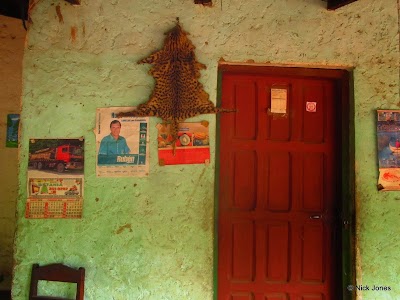 |
| Nice animal skin |
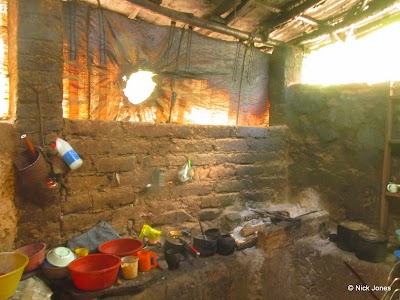 |
| Kitchen |
Beginning the trail I realise that the path is blatantly obvious and there is no possibility of getting lost, I could walk up with my helmet on backwards and there is certainly no need for the machete which I lean against a tree to collect on the way back.
I have this thing about trying to complete hikes in half the guide time. I don’t know why, it’s not to prove a point, I just like pounding uphill and it actually takes me less than two hours to arrive at the summit, which in contrast to the scorching valley is cool and nestled in thick damp fog.
 |
| Reaching the top I found it nestled in fog, no chance of seeing Condors, I was extremely disappointed |
The fog makes for impossible condor viewing and I sit despondently, ruing my bad luck and eat lunch. It tastes bland and dry. However, I’m not really sure I’m in the right spot, is this the top, or is there a higher peak up there, maybe out of the mist? There’s certainly no signposts, so I go in search, visiting the neighbouring peaks all the time knowing it is pointless as the condors won’t fly in cloud. I walk miles. When I finally return to my lunch spot, I decide I can wait until a latest of 4pm, at which point I must descend before darkness to look for camp, though the cloud shows no signs of clearing, thick and unbroken.
At 4:10pm the cloud, within seconds, miraculously clears. Almost instantly I spot something far, far, far off, circling below, perhaps a mile or even two away, just a circling black dot. I watch it for a while, sweeping around, losing the small dark shape occasionally amongst the shades of rock until all of a sudden it catches a thermals, rises effortlessly and incredibly quickly and more miraculous yet, turns towards me! As if it had spotted me all that way away it comes over, all the while getting bigger and bigger and BIGGER, until finally right above me, staring down with a beady eye and with intrigue and its gigantic 3m wing span. I watch it land heavily on the rocky outcrop to my right, curling up its wings somehow on its body. I try sneaking towards it until I see it unsheathe its wings and jump off to float in circles below. I see the long white stripe across its wings, then it catches a thermal shoots up and disappears back into the distance.
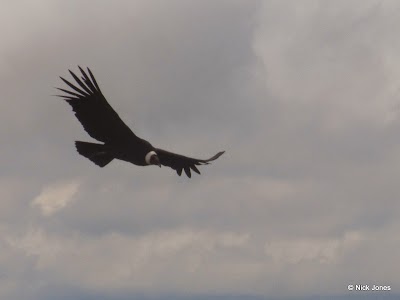 |
| I stuck around until after 4pm and miraculously the cloud cleared, and out came Clive the Condor |
 |
| I found this nice little patch to camp at on my way to Valle Grande |
[Camp 536]
With my visa running out I have to get a move on and began heading back towards the west of Bolivia and Uyuni to cross into Chile via the altiplano…..though I’d happily stay forever.





